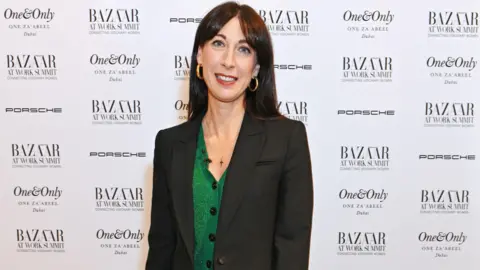Faarea MasudBusiness reporter
 Dave Bennett/Getty Images
Dave Bennett/Getty ImagesThe fashion label founded by Samantha Cameron, the wife of former Prime Minister David Cameron, is to close after struggling with rising costs.
Lady Cameron confirmed on social media that she was winding down Cefinn after eight years, saying “international trading restrictions” had also harmed the business.
“This was not a decision I have taken lightly, especially as we have recently seen strong trading figures,” she said in a statement.
She added that the label’s online shop and stores on Elizabeth Street and the King’s Road in London would stay open over the “coming months” to sell remaining stock.
The label describes itself as a “contemporary clothing brand for busy women”, offering office and casual wear priced at the higher end of the market.
Trousers sell for anywhere between £150 – £250, and floral dresses are priced around £300.
Cefinn’s site says every piece in its collection is designed by Samantha Cameron and the name of the label is thought to be derived from the first and last letters of the Cameron name, with the initials of the couple’s four children in between.
The fashion firm said it was increasingly difficult for “a small company navigating the turbulence in the fashion wholesale sector, ongoing cost pressures and international trading restrictions”.
Many fashion retailers in the UK have highlighted the increased costs, such as staff wages, and higher rates of National Insurance, impacting finances, along with changes in shopping habits.
Last month, River Island was given the green light to close 33 stores across the UK after the High Court approved the fashion retailer’s restructuring plans.
Accessories chain Claire’s meanwhile collapsed into administration, putting 2,150 jobs at risk.
Experts said as many of its suppliers were in Asia and it was struggling with the costs of tariffs imposed by US President Donald Trump, which has bumped up costs of transporting material across borders.
Fashion journalist Priya Raj says it was currently a difficult time for the segment of the market that Lady Cameron was aiming for.
“It was niche from the perspective that the clothing is not a high street price, though not quite high-end luxury,” she said, adding its market was “narrow”.
“High-end luxury brands don’t really need to worry about economic downturn because their clientele’s spending habits are likely to be unaffected, for the most part. And big high-street brands are working on such a big scale that again, people are going to keep spending”, she added.
The fashion space in Britain has also been struggling as people find cheaper alternatives from online rivals like Shein and Temu, and can find bargains in luxury fashion on second-hand apps such as Vinted or Depop, which have marketed aggressively to their target consumers.
Priya added that people “just don’t care enough about celebrity-led brands, unless it’s a celebrity they really connect to or is high profile enough”.
“David Cameron’s stint as PM ended in 2016, and the brand launched in 2017, so she was still riding this wave of relevance.”
Cefinn said that its upcoming winter collection, to be released in late September, would be its last offering.








